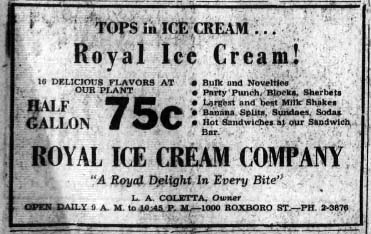Royal Ice Cream Sit-In
Research Branch, NC Office of Archives and History, 2007
https://www.dncr.nc.gov/about-us/history/division-historical-resources/nc-highway-historical-marker-program
See also: Royal Ice Cream Sit-In for K-8 Students.
Segregation protest at an ice cream parlor located at Roxboro and Dowd Streets in Durham, N.C., June 23, 1957, led to court case testing dual racial facilities.
The 1960 Greensboro sit-ins sparked a national movement but were not the first such action. Individual and group protest actions prior to 1960, generally isolated and often without wider impact, took place across the state and region. A protest in 1957 in Durham had wider consequence, as it led to a court case testing the legality of segregated facilities. The Royal Ice Cream Company had a doorway on the Dowd Street side with a “White Only” sign and, on Roxboro Street, a sign marked “Colored Only.” A partition separated the two sections inside the building.

On June 23, 1957, Rev. Douglas Moore, pastor of Asbury Temple Methodist Church, and six others assembled at the church to plan the protest. The young African Americans moved over to Royal Ice Cream and took up booths. When they refused to budge, the manager called the police who charged them with trespassing. Newspaper coverage in the Durham-Raleigh area was mixed. The Durham papers printed the story on the front-page the next day but it was buried inside the Raleigh News and Observer; The Carolinian, an African American newspaper, placed it on the front page.
On June 24 the protestors were found guilty of trespassing and each fined $10 plus court costs. On appeal the case went to Superior Court and a jury trial. An all-white jury rendered a guilty verdict of trespass on each defendant. The case was appealed to the North Carolina Supreme Court that upheld the law regarding segregated facilities. On July 15, 1958, the seven protesters paid fines totaling $433.25. Attorneys appealed the decision to the U.S. Supreme Court but the High Court refused to hear the case.
Educator Resources:
Grades K-8: https://www.ncpedia.org/royal-ice-cream-K-8
References:
Dennis Daniels, research report, 2002, North Carolina Office of Archives and History
Durham County Superior Court Minute Docket, Vol. 45, 1956-1958, pages 310, 312, and 545
North Carolina Reports 247 (Fall Term 1957 and Spring Term 1958): 455-462
The Carolinian, June 29, 1957
Durham Morning Herald, June 24, 1957; June 25, 1957; July 17, 1957; July 18, 1957; January 11, 1958; December 5, 1979; December 9, 1979; and January 13, 1980
Durham Sun, June 24, 1957; July 17, 1957; and January 10, 1958
Durham Herald-Sun, December 12, 2000
News and Observer, June 25, 1957
Additional Resources and Images:
"Tempo of Drive On Ice Cream Co. Is Increased." The Carolina Times, December 15, 1962. https://newspapers.digitalnc.org/lccn/sn83045120/1962-12-15/ed-1/seq-1/
"Boycott Narrows to Five." The Carolina Times, April 1, 1961. https://newspapers.digitalnc.org/lccn/sn83045120/1961-04-01/ed-1/seq-1/
Images of the Royal Ice Cream building and protests, from OpenDurham. https://www.opendurham.org/buildings/royal-ice-cream-charlie-dunhams-uni... (accessed April 12, 2016).
Image Credits:
[Royal Ice Cream, advertisement]. Carolina Times, August 16, 1958. https://newspapers.digitalnc.org/lccn/sn83045120/1958-08-16/ed-1/seq-6/
8 April 2016 | Daniels, Dennis F.